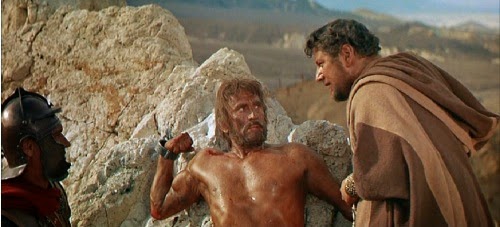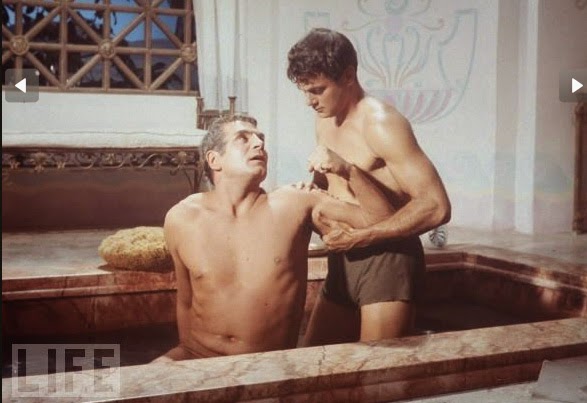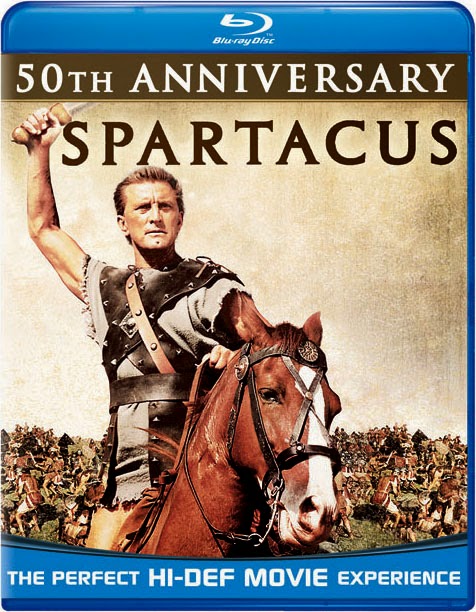 What was done for 12 million dollars is astounding by
today's standards. While the film is dated, the direction by Stanley Kubrick is
brilliant, although the final print was something Kubrick was not so favorable
of. The all-star cast features the likes
of Tony Curtis, Kirk Douglas and Peter Ustinov as mentioned above along with
Jean Simmons as Spartacus love interest Varinia and Laurence Olivier. I watched
the 50th Anniversary edition on Blu-ray and was shocked and pleasantly
surprised at the quality of transfer of picture and the quality of the sound. The
transfer and restoration of the film was pushed and headed up by Steven
Spielberg with the blessings of Kubrick. While over 3 1/2 hours in length, the
movie flows nicely and the cinematography, which also won an Oscar, is
stunning. While the film was initially blacklisted for political reasons,
President John Kennedy crossed the picket lines to bring the film to national prevalence.
What was done for 12 million dollars is astounding by
today's standards. While the film is dated, the direction by Stanley Kubrick is
brilliant, although the final print was something Kubrick was not so favorable
of. The all-star cast features the likes
of Tony Curtis, Kirk Douglas and Peter Ustinov as mentioned above along with
Jean Simmons as Spartacus love interest Varinia and Laurence Olivier. I watched
the 50th Anniversary edition on Blu-ray and was shocked and pleasantly
surprised at the quality of transfer of picture and the quality of the sound. The
transfer and restoration of the film was pushed and headed up by Steven
Spielberg with the blessings of Kubrick. While over 3 1/2 hours in length, the
movie flows nicely and the cinematography, which also won an Oscar, is
stunning. While the film was initially blacklisted for political reasons,
President John Kennedy crossed the picket lines to bring the film to national prevalence.
The irony of this particular review is that it is a part of
the Lenten Series Reviews for Hollywood Jesus. While looking at it's placement,
during Holy Week, I couldn't help but notice the similarities to not only how
the movie was made but the content and story of the movie in regards to the
world situations that seem to constantly exist and the need of so many who feel
oppressed, abused and used by a system who doesn't appreciate or take seriously
the potential and importance of the people around them. It is likely one of the
reasons the movie got into so much trouble when made. There were Communist
threats and the world was in the middle of the Cold War. There were clear
distinctions between the wealthy and clear evidence of the power of the
political elite. The savior, for that system was Spartacus, based on a historical
character who had gone from freedom to slavery to gladiator to attempted
liberator. Spartacus realized, that when some profit off of the experiences of
the least of these, including slavery or a form of servitude including the
abuse of the poor for the gain of the wealthy and politically powerful, there
is a problem.
 The movie Spartacus had clear intent in its making to show
the power of Christianity as well as the references to the cross and
crucifixion, even going so far as in the opening voice over stating that
Christianity would be the eventual fall of Rome. While we don't see the primary
characters as adhering to any particular religious belief system, we do see
them praying, recognizing not just the power of God's but of a God. We also see
the conditions which made it right for the eventual coming and birth of Jesus. We
also see a great deal of imagery that focuses on the willingness of one to live
out their convictions, dedicated to not only serving the least of these, but
also having the least of these become disciples of a leader.
The movie Spartacus had clear intent in its making to show
the power of Christianity as well as the references to the cross and
crucifixion, even going so far as in the opening voice over stating that
Christianity would be the eventual fall of Rome. While we don't see the primary
characters as adhering to any particular religious belief system, we do see
them praying, recognizing not just the power of God's but of a God. We also see
the conditions which made it right for the eventual coming and birth of Jesus. We
also see a great deal of imagery that focuses on the willingness of one to live
out their convictions, dedicated to not only serving the least of these, but
also having the least of these become disciples of a leader.  Spartacus is not presented as a god, although many saw him as a god. We see him
as a "simple man willing to serve thousands and the day he would die,
thousands would not only be willing to die for him," many would die for
him. In the oppression of Rome,
Spartacus realizes, "death is the only freedom a slave knows and to die is
gain." We see Spartacus towards the
conclusion of the film willing to give himself up on the cross to prevent a man
many say in the book by Howard Fast and in subsequent other versions of the
story was a gay man from enduring the pain of the cross. While the character, Antoninus,
played by Tony Curtis here only hints at
his homosexuality, there is still a clear willingness for Spartacus, the
Messiah Figure to offer his life to prevent the ongoing pain and agony of the
cross for Antoninus. We also see that character, like so many others, willing
to give their life for Spartacus because while he may not have liberated their
bodies from Rome,
he has liberated their souls. We see a concept presenting the power of hope
when Spartacus says; "When one man says no, wrong begins to fear." There
is power among the people especially those who have been hurt, abused and enslaved.
We see that power towards the end of the film as Rome is seeking to single out and make an
example of Spartacus. Rome
has won the final battle against the rebel forces. The movies infamous line
comes about as each of Spartacus
soldiers, stands up, one by one, yelling out as they have been asked by Rome for Spartacus to
volunteer himself for certain crucifixion to save the lives of the rebels who
will become slaves, "I am Spartacus!" In their willingness to stand up, they are
showing they are willing to give their lives up for this man, Spartacus.
Spartacus is not presented as a god, although many saw him as a god. We see him
as a "simple man willing to serve thousands and the day he would die,
thousands would not only be willing to die for him," many would die for
him. In the oppression of Rome,
Spartacus realizes, "death is the only freedom a slave knows and to die is
gain." We see Spartacus towards the
conclusion of the film willing to give himself up on the cross to prevent a man
many say in the book by Howard Fast and in subsequent other versions of the
story was a gay man from enduring the pain of the cross. While the character, Antoninus,
played by Tony Curtis here only hints at
his homosexuality, there is still a clear willingness for Spartacus, the
Messiah Figure to offer his life to prevent the ongoing pain and agony of the
cross for Antoninus. We also see that character, like so many others, willing
to give their life for Spartacus because while he may not have liberated their
bodies from Rome,
he has liberated their souls. We see a concept presenting the power of hope
when Spartacus says; "When one man says no, wrong begins to fear." There
is power among the people especially those who have been hurt, abused and enslaved.
We see that power towards the end of the film as Rome is seeking to single out and make an
example of Spartacus. Rome
has won the final battle against the rebel forces. The movies infamous line
comes about as each of Spartacus
soldiers, stands up, one by one, yelling out as they have been asked by Rome for Spartacus to
volunteer himself for certain crucifixion to save the lives of the rebels who
will become slaves, "I am Spartacus!" In their willingness to stand up, they are
showing they are willing to give their lives up for this man, Spartacus.  As I watched the dramatic presentation of Spartacus, during this Lenten season,
I couldn't help but think of the obvious comparisons between the character of
Spartacus, and the willingness of his followers to follow him, and my own
willingness to follow Jesus. Am I willing to surrender all, even if need be, to
the point of death? While the cross is not as pointed and brutal as we see in
the movie of The Passion of the Christ, we still see the horror of the cross as
it existed in the Roman Empire. People were
executed by the thousands in what is thought by many to be the most brutal form
of execution ever. Yet we still see the love Spartacus has for others in his
willingness to take up the cross so those he loves doesn't have to suffer it. I
was reminded of the Biblical concept, that no greater love has any of us than
our own willingness to lay down our life for a friend.
As I watched the dramatic presentation of Spartacus, during this Lenten season,
I couldn't help but think of the obvious comparisons between the character of
Spartacus, and the willingness of his followers to follow him, and my own
willingness to follow Jesus. Am I willing to surrender all, even if need be, to
the point of death? While the cross is not as pointed and brutal as we see in
the movie of The Passion of the Christ, we still see the horror of the cross as
it existed in the Roman Empire. People were
executed by the thousands in what is thought by many to be the most brutal form
of execution ever. Yet we still see the love Spartacus has for others in his
willingness to take up the cross so those he loves doesn't have to suffer it. I
was reminded of the Biblical concept, that no greater love has any of us than
our own willingness to lay down our life for a friend. I really like the story of Spartacus, that said, this 3 1/2 hour epic really does little justice to the story and complexity of the character of Spartacus, the time he lived and the people around him. It, isn't to say this isn't a great movie, it deserves all of the acclaim it has garnished over its 50+ years, but the character and the story is much more complex than even a 3 1/2 hour film can present. While the 1960 film touches on much of the sexual oppression and abuse during the time, due to the time the film was made, the late 1950's, many things were glossed over. These things are a critical component in the times of the story and the environment it took place. Knowing these things adds to the power of the story and in its lead character we see a simple man, holding true to his values where others can glean from and follow in a sacrificial way. Spartacus is willing to sacrifice for the multitudes.
 As we celebrate the Easter season, let's remember that a
more complete and perfect sacrifice was offered that allows us to follow not
just a simple man but a God who provides eternal life. While on this earth Christ calls us to love
our fellow human, to stand up for them, despite their sexuality, income, country
of origin, color of their skin, whatever. We are called to love just like
Christ loved, whosoever. We can sacrificially
display that true freedom comes from within, it is available to all people and comes
through Christ. Spartacus is a wonderful reminder during Lent, the sacrifices are
worth it. In those sacrifices we discover, real freedom despite our
circumstances, a freedom that comes from a servant leader, whose life we
celebrate that ended on the cross, Jesus.
Thankfully Jesus story doesn't end at the cross though, but through his
resurrection. It is that resurrection that gives the eternal hope of a bright
and glorious future.
As we celebrate the Easter season, let's remember that a
more complete and perfect sacrifice was offered that allows us to follow not
just a simple man but a God who provides eternal life. While on this earth Christ calls us to love
our fellow human, to stand up for them, despite their sexuality, income, country
of origin, color of their skin, whatever. We are called to love just like
Christ loved, whosoever. We can sacrificially
display that true freedom comes from within, it is available to all people and comes
through Christ. Spartacus is a wonderful reminder during Lent, the sacrifices are
worth it. In those sacrifices we discover, real freedom despite our
circumstances, a freedom that comes from a servant leader, whose life we
celebrate that ended on the cross, Jesus.
Thankfully Jesus story doesn't end at the cross though, but through his
resurrection. It is that resurrection that gives the eternal hope of a bright
and glorious future.To see the original trailer for the movie, click on the video below, if the video doesn't appear, click on the following link:
https://www.youtube.com/watch?v=HcIMY1Ah3aw
The Virtual Pew and our other work is supported solely by the kind contributions of others. You can click on the donate button below to give any amount to this work that does so much more than just post articles on the net; I draw no ongoing salary from the church I pastor, Mosaic Wichita which is predominantly a homeless church; I am grateful for any small amount you can contribute to help with this ministry. Believe me there is much more going on than most realize. I will also provide information to verify the ministry and income that comes into this ministry and work. Thanks and feel free to share any material from The Virtual Pew, I only ask that appropriate credit is given and a link to the original site with the materials provided.
Click here to read about, and order the book, The Keystone Kid

Click here to visit the web page The Virtual Pew
Click here to follow The Virtual Pew on Twitter
Mike Furches on Faceboook.
Click here to visit Mosaic Church where Mike is Pastor
The Keystone Kid/Virtual Pew Message Boards
Click to subscribe to my blog
There are hundreds of postings so make sure to check out the archives. You can also contact me for a free audio book link of The Keystone Kid at mike@furches.org You can visit http://www.thevirtualpew.com/.
Hopefully you will consider a gift to The Virtual Pew.
Now I get asked this quite often, Can we repost your blogs or articles? The short answer to that is, what an honor that you would ask, and by all means, spread the word. Here is our contact information
The Virtual Pew
1249 N. St. Francis
Wichita Kansas, 67214
Email: mike@furches.org
Click on the following links to learn more about The Virtual Pew
Donations to The Virtual Pew
The Virtual Pew Blog
Personal Furches Web Site
Hollywood Jesus
Reviews With Mike
The Virtual Pew Sermons
The Virtual Pew News



No comments:
Post a Comment